#quirky fantasies or violent fantasies? get you a woman that can do both
Text



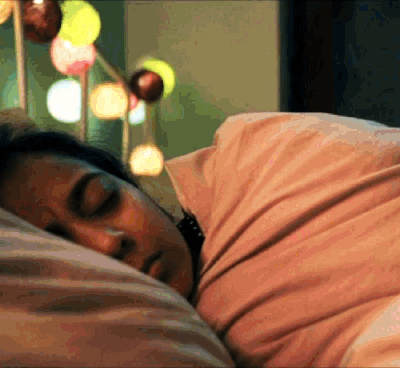

Creative Visualisation: Use the Power of Your Imagination to Create What You Want in Your Life
NIDA's version vs. AMINA's version
black mirror 06.05 x we are lady parts s01
#quirky fantasies or violent fantasies? get you a woman that can do both#her black mirror character has the same name as the creator of we are lady parts. that's no coincidence!!!! conspiracy board dot jpg#anjana vasan#black mirror#demon 79#we are lady parts
130 notes
·
View notes
Text
Infinity Train, S1-3
Infinity Train is a Cartoon Network animated series (now transferred to HBO Max) that premiered last year. Three seasons, each made up of ten 10-minute episodes, have aired, so you can watch the whole thing in an afternoon. The premise is quite familiar - the titular train picks up passengers (mostly, though not always, children) who are at some kind of crossroads in their lives. As they traverse cars filled with challenges, puzzles, dangers, and sometimes just nifty environments to explore, the passengers work through whatever issue brought them on to the train. Their progress towards wellness is reflected in a number that appears on their hand, and when the number drops to zero a vortex appears and returns them to their home. The train also contains native inhabitants, usually referred to as “denizens”, who sometimes help the passengers, sometimes hinder them, and are often just going about their own lives.
Like I said, the sort of premise familiar from many children’s stories, in which a character who is struggling with some important challenge or milestone is whisked off to a fantasy setting that just happens to have been tailored to help them work through their problems. The execution is pretty fantastic, with both the writing and animation striking a compelling mixture of humor and emotional depth. The train itself is a wonderful creation, vast and often surreal or even phantasmagorical, and the denizens are quirky and winning in their own right, not just as reflections of the passengers’ needs. The show also features an absolutely stacked voice cast, with guest appearances from Kate Mulgrew, Bradley Whitford, Ernie Hudson, Lena Headey, and many others.
But what I find fascinating about Infinity Train is how, almost from the first episode, it sets to work examining the core assumptions of its story template, chiefly the idea that the train is helping people, and that its kind of help is effective and positive. As someone who grew up on stories like Infinity Train and didn’t question their premise until I got older, it’s fun to watch a show that leans right into those inherent problems.
The first season of Infinity Train tells its story pretty straight. Our protagonist is Tulip, a tween who is struggling with her parents’ recent divorce. When a scheduling snafu between them leaves Tulip unable to get to a youth coding camp she’d been dreaming of, she impulsively runs away from home, and ends up being picked up by the train. There, she’s quickly joined by a royal corgi called Atticus, and a scatterbrained robot called One-One, who try to help her in her journey towards the train’s engine. Along the way, the trio are menaced by a sinister, semi-robotic figure who is destroying the environments in the train’s cars, and who seems to be fixated on One-One.
Even in this fairly basic spin on the story, a few reservations crop up: first, Tulip doesn’t actually have a real problem. Yes, her parents’ divorce has put a strain on her, but she still seems fairly well-adjusted - she has friends and interests and, apart from the ill-advised decision to run away, doesn’t seem to be acting out in dangerous ways. The things she learns over the course of her journey through the train - to face up to the hurt that her family’s breakdown has caused her, to admit that her parents’ marriage wasn’t perfect, to realize that their divorce wasn’t her fault, to ask for help when she needs it - are probably things she would have figured out as she gained some distance from the trauma of the divorce (or, for that matter, that any halfway-decent child psychologist would have helped her realize). It’s hard to justify a cosmic interference in her life, much less one that puts her in mortal danger, as the journey up the Infinity Train often does
And sure, this is a children’s adventure story, so it’s far more compelling to watch the child protagonist struggle with real danger (that is always avoided at the last possible minute) than attend a therapy session. Even if, as adult viewers, we might see the whole thing as unjustifiably risky. But the thing is, Tulip herself very quickly expresses resentment towards the train. When she realizes that the number on her hand drops when she does something healthy and good, Tulip’s reaction is anger, and for a while she refuses to cooperate with the system, covering her hand and refusing to consider how her actions are affecting her number. Even within the children’s adventure template, the child protagonist says what most of us would feel in her situation - that being kidnapped and made to jump through hoops for the sake of some seemingly arbitrary, numerical value of “wellness” is high-handed and manipulative, and encourages hostility and suspicion, rather than participation in the train’s system.
Ultimately, Tulip goes back to playing along with the train’s scheme and benefits from it. She gets her number down to zero fairly quickly, and gets to go back home. But along the way she also solves the mystery of the train’s mysterious villain, who turns out to be another passenger, Amelia, who was picked up by the train after the death of her husband. Instead of letting the train walk her through her grief and learn to accept it, Amelia tried to take over the train and use its reality-bending capabilities to recreate her lost husband. Along the way she’s committed so many acts of abuse and mayhem that her number has extended all the way to her neck. So even once Tulip talks her down and convinces her to stop hurting people, they both acknowledge that she’s never going to get off the train (oh, and by the way, the journey on the train happens in real time, so Amelia is now an old woman).
Now, it should be obvious that Amelia’s problem was significantly more complex and fraught than Tulip’s, and rather than helping her, the train gave her a venue to indulge her grief to anti-social, even psychotic extremes. So at the end of the first season, we’ve encountered two passengers. One who benefitted from the train’s system (after some initial hostility) but who also probably didn’t need its help that badly. And one who did need serious help, but instead got an opportuntity to screw her life up even more than it already was, and probably irrevocably. Not a great track record, in other words.
The second season mixes things up a bit by making its protagonist a train denizen, and giving us a behind the scenes look at the train’s community when the passengers aren’t there. MT (or: Mirror Tulip) is a character first encountered in the first season, whom Tulip helped to escape from the mirror world. She’s being pursued by mirror cops who want to destroy her, and in the process of evading them, she comes across a passenger, Jesse, and decides to help him get his number down so that she can piggyback on his exit and evade her pursuers. Jesse initially seems like he doesn’t belong on the train - he’s almost preternaturally friendly and happy-go-lucky. But it’s eventually revealed that his willingness to go along and get along is fairly indiscriminate, and leaves him prey to stronger personalities, as when he tolerates and even enables the violent bullying of his younger brother.
It’s a thornier problem than Tulip’s, not least for making it harder to sympathize with Jesse. But it’s also one that exposes the train system’s flaws, as Jesse is so passive that he doesn’t even try to move through cars and get his number down until MT lights a fire under him. And that, in turn, triggers MT’s own identity crisis, as she begins to wonder whether she has a right to exist as her own person, or whether her entire purpose is to reflect Tulip or help passengers.
That tension comes to a head when Jesse and MT encounter the Apex, a group of child passengers, led by teenagers Grace and Simon. The Apex have come up with a theory of the train’s nature that runs completely counter to its actual purpose - they believe the train is their reward, and that the system trying to bring their number down and send them back is cheating them. They strive to get their number as high as possible by committing acts of violence against the train’s denizens, whom they dub “nulls” - not real people, incapable of feeling pain.
Because S2 has been told from MT’s perspective, we know that the Apex are wrong about her and the other denizens (and in general, it’s not a good sign when someone says “this being, which exhibits all the signs of personhood and feeling, is actually not real, and is only shamming a form of suffering while feeling nothing”). But at the same time, it has to be acknowledged that this is an entirely plausible conclusion to draw from the evidence at hand. The train exists for the passeners. It has created environments and beings whose sole purpose is to interact with and affect the passengers. Why should those beings be real? Which is yet another failure point of the train’s system, because as both Tulip and Jesse’s stories show, developing connections with denizens is what spurs passengers to travel up the train and get better. The Apex have therefore interpreted the train’s system in a way that can only accomplish the exact opposite of what it was designed to do.
The show returns to Grace and Simon in its third season, in which we learn more about their history and their understanding of the train. We learn, for example, that Simon’s hostility towards denizens was sparked when the one who befriended him (The Cat, a character who appears in each of the show’s seasons) left him when they found themselves in a dangerous situation. And we learn that the Apex worship Amelia (whom they view as the train’s true conductor) and believe that the current system is a corruption of the one she intended, in which the passengers get to enjoy the train for as long as they like. In yet another demonstration of how open the train’s system is to misinterpretation, the Apex warn their new members that if they let their number get down to zero, they will “disappear”. Which is the same reaction Tulip had when she first witnessed another passenger departing, and, again, a thoroughly logical conclusion to reach given the evidence.
The season’s story involves Grace and Simon being separated from the rest of the Apex, and, in their attempts to get back to them, picking up a young passenger, Hazel, whom they try to initiate into their understanding of the train. The two teens’ interactions with Hazel shed light on the crucial difference between them. While Grace genuinely cares about the kids she’s gathered and sees herself as their protector, Simon only teaches Hazel about the train because he wants converts to his worldview, and validation for his anger at the Cat and other denizens. Once separated from the Apex and their regular schedule of destruction, Grace’s care for Hazel causes her number to go down, all the more so when she discovers that Hazel is really a denizen, and lies to Simon about it to protect her. Simon, meanwhile, only sinks further into his anger and resentment, and when he discovers Grace’s lie he sees it as a betrayal of everything they stand for. The conflict between them ultimately leads to a confrontation in which Simon is killed, while Grace reveals to the Apex that their conclusions about the train and its denizens were wrong, and that they need to come up with a new system.
So, to sum up, the Infinity Train:
Kidnaps people whom it perceives as being in need of help and holds them, sometimes for years or decades, until they achieve a predetermined threshold of wellness.
Advances this goal through a system of rewards and punishments that is so transparently manipulative, it alienates basically everyone who engages with it except the guy whose problem was being pathologically passive.
Relies for the success of this system on a community of denizens who haven’t signed on to it and who are often unsuited to the task of shepherding others towards growth.
Is so open to misinterpretation that a large chunk of the train’s passengers take the exact opposite message from it that they were meant to, which leads them to behavior that could put them permanently beyond being able to leave the train.
Sometimes kills people.
I’m pretty sure most of this is stuff I’m meant to be taking away from the show, but I also wonder how far Infinity Train is willing, or able, to take this idea. The open ending of S3, in which Grace, though headed in the right direction number-wise, is still nowhere near being able to leave the train, and also more focused on remaking the Apex into something more constructive, suggests that future seasons will get further into the question of whether the train can be reformed or made more productive. Or, conversely, the show could abandon its original premise and just become a story about the train, and the community of passengers and denizens that develops on it. I wonder, though, how much you can push against the inherent limitations of this premise - when you’ve got a story where getting better and more well-adjusted causes you to be forcibly ejected from the story, where does that leave you as far as plot progression and character development are concerned? There’s an inherent conflict to a world that is designed for a specific character (or group of characters). Infinity Train is fascinating for how it leans into that conflict, and I’m very curious to see how it handles its core contradiction going forward.
50 notes
·
View notes
Text
miasswier’s ultimate glee ranking: no 64
64: The Untitled Rachel Berry Project
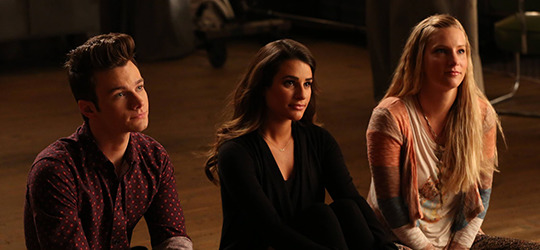
Written by: Matthew Hodgson
Directed by: Brad Falchuk
Overall Thoughts: The New York arc comes to a close, and it does so decently. It’s an enjoyable episode with some fun music, some pretty hilarious scenes, and it properly concludes most of the stories that they’d introduced for this arc. Still, there are things I have a hard time with – the Samcedes break up in particular. Let’s get into it.
What I Like:
That Kurt and Blaine are actually allowed to have a conversation about their relationships and the fact that Blaine lied to Kurt. I don’t really like that Kurt took some of the blame, but Blaine was fully apologetic, and not in the way that he was when he admitted he cheated – genuinely apologetic, taking the full blame, not insinuating at all that anything Kurt did led him to this. Character development, anyone?
Sam having the opportunity to cheat on Mercedes and not taking it. Not only that, but thinking that another woman kissing him was cheating. As much as I have frustrations with his character, particularly when it comes to his views on sex and how everyone encourages those views, he is a sweetheart.
Kurt and Blaine proving June wrong about Kurt.
Rachel standing up for herself and her future (terrible) TV show.
The whole scene with the script, except for one part, which I’ll mention in a bit.
Mercedes going on a mall tour and taking Brittany and Santana with her and already having a group of people following her and excited to see her perform. It’s what she deserves.
Rachel is so adorably excited about her TV show.
What I Don’t Like:
That a fantasy script sequence shows Blaine and Brittany being more intimate with each other than they are ever allowed to be with their actual love interests. Also, the “mostly lesbian” line.
While I get that Kurt is in his right to be angry that Blaine lied to him, it does concern me a little bit that he has such a physically violent reaction. We’ve seen this only once before, when he kicked that chair over in season 1, which makes me think this is just a director thing (even though the episodes weren’t directed by the same person) and not actually a character thing, but it’s still a bit concerning. Kurt, you should be able to express your anger without hitting/kicking things.
The fact that they had Sam and Mercedes break up by Mercedes essentially saying “it isn’t fair for me to ask you not to fuck other women, so go do that”. Seriously, this entire storyline was so dragged down by the idea that men literally cannot survive without sex. I would have much preferred that they break up because they will be separated for a long time and their relationship is still fairly new. Instead we have Mercedes basically saying “Yo, Sam, go fuck all the girls you want, and then when I’m ready we can get married” like, what? ALSO Sam saying “no matter who I’m with or what I’m doing, just know I’d rather be doing it with you” aw how sweet that you’re going to fuck another girl and think of Mercedes while you do it like that’s not totally disrespectful to both Mercedes and the other girl? Think of the girl you’re with, damn Sam. But of course it’s played off as super romantic because Hollywood. Seriously, why does Hollywood think that a guy is going to literally die if he doesn’t have sex? Do they not know how harmful that is? How many women suffer because of men who think they are owed sex because they’re men and therefore they have Needs? Jesus Christ (I’m feeling particularly strongly about this right now because of the attack in Toronto that happened for exactly this reason, and it’s just so avoidable and unnecessary. Fuck).
Aaaaaaaand once again Artie has literally nothing to do.
Glee did so well with avoiding the quirky, special snowflake character right until now. Why, writer lady? Why?
Songs:
Shakin’ My Head: The song is so dancey and fun but the lyrics are so strange haha
All of Me: A nice duet, though I do feel it goes on a bit long.
Girls on Film: Kind of a weird one. I don’t know how I feel about the aesthetic of it.
Glitter in the Air: I mean, I get this is that writer lady’s first time hearing Rachel sing, but it isn’t mine, and these power ballads of hers just ain’t as powerful as they used to be. Sorry, honey.
No Time at All: Too long as well, and kind of unnecessary. I wish they’d just done part of it, like maybe the end? I don’t know.
American Boy: I was skeptical when they released that this was going to be one of the songs in this episode, but it ended up being really good!
Pompeii: A great finale song! Sam in particular sounds awesome on it, and that scene where he goes back to McKinley always gets me all emotional, even though he’s only been gone from McKinley for like 7 episodes.
Final Thoughts: It’s a fun episode, but the way the Samcedes break-up is dealt with really brings it down for me. I felt they deserved better than “It’s too hard for Sam not to have sex”, especially after all they’d been through. Other than that, though, it’s a decent season finale, and sets up next season in an okay way (aside from leaving Klaine on such a good note only to pull the rug out from under us in episode one of the next season).
4 notes
·
View notes
Text
Mandatory bughead post #2: My thoughts on Bughead and why it is important.
I’m aware that the words ‘bughead’ & ‘important’ in the same sentence seem like a misfit but there is a good reason why I’ve chosen to write it so. This thought came to my mind whilst trawling through the morass of ‘ships’ & ‘ship-wrecks’ on tumblr & twitter about Riverdale.
Now, I’m not someone who watches a lot of TV shows ,however, Riverdale was a serendipitous discovery that happened to me two weeks ago.
I have been a fan of Archie comics since I was little & my two favourite characters were Jughead & Betty, in that order. Watching Riverdale was a revelation as it brought me back to the Archie’s world and I saw it in a new light. I went into it without expectations.
What I was not prepared for was how Bughead would gently creep up on me and reign over my entire existence in such a short span of time.
You see, I have had a few ships, some fleeting and some enduring,some canon and some fantasy, however nothing as rabid or as intense that’d induce an “I’m SHOOK” moment. Until bughead happened.
When I used to read the comic books, I had wanted Archie to one day wake up & realize that Betty was the one for her, because I could so relate to her as a kind & sweet girl, being taken for granted every time and with a history of unrequited love. I’m 30 now and life-experiences, especially of the bitter kind has certainly changed my perspective about these things, especially about romantic relationships. No more suffering fairy-tale princesses for me.
In the comics, although Jughead and Betty were my favourites and they always were good to each other, the thought of them as a potential match had never crossed my mind. I was intrigued and amused by Jughead’s woman-hating stance and had imagined that one day an extraordinary woman worthy of him would come and sweep him off his feet.I had no concept of sexuality and its associated complications that we see today, it was only a pure and innocent fantasy in my mind.
I had only been familiar with the ‘classic’ and humorous golden age Archie comic digests and was unaware of the modern reboots and the various universes. Therefore, when I started watching Riverdale, I was immediately hooked to its modern,quirky & dark narrative and had my assumptions broken down bit by bit with each episode. When I started with the show, five episodes were already in so I binge watched them in a single night, which left me with little time to process the minute details and subtleties, which is why I missed noticing the growing chemistry Betty and Jughead.
It was only when I began exploring the show on the internet and understood the whole narrative and tone of the show,re-watched the episodes, saw the interviews, trawled Tumblr & youtube and accidentally saw the leaked bughead kiss is when it hit me like slap on the face and a swift kick in the ovaries. It nearly felt like enlightenment!
Once I had seen and felt it, there was no going back. It was a like a virus firmly implanted in my psyche. I resurrected my dormant and inactive tumblr and twitter accounts only to ship bughead. I’m sure fellow bughead fans know the drill of our coming undone so I won’t go into much detail.
Coming to the next part. Riverdale or rather Bughead has come into my life as a breath of fresh air when I am going through a very dark and stressful phase. I have been going through a very difficult divorce from a man, who caused mental abuse and cheated my family of money & absconded and left me to deal with the consequences and legal battles, triggering my anxiety,fear and depression. A man whom I had trusted with my everything and was completely vulnerable to, used me and left me with a deep fear and mistrust of relationships, trauma and some very hard learnt lessons. I’m an eternal romantic but a part of me has become cynical about it.
Riverdale is a unique show as is evident in its excellent writing,for those who care to notice the nuances and characterisations. The symbolism, fore-shadowing, word-play, subtle body-language cues of the characters, parallelism and of course, a quality mystery is the gold-standard of writing. Can we also talk about the wonderful and talented cast who have given life to the characters? The show is a slow burn and not for those with a shallow mind who are looking for popcorn entertainment with a lot of mindless drama and illogical and unstable romantic pairings based on lust and superficial chemistry,
Bughead is not just a run of the mill ship that people are fangirling over. It is beautiful union which tells you the story of two woefully young and tender yet jaded individuals, thrown together by a tragic fate, who are battling the darkness within and without, fighting for something that’s bigger than them and their personal problems. They are fighting for justice, light and hope. In spite of their struggle with their personal demons. Can you imagine what they are going through? For any child, parents are the safe space when the world around them crumbles, but both Betty and Jughead’s parents let them down with lies, manipulation and broken promises and the possibility that their families could be the perpetrators of murder. Under such horrible circumstances, they find the safe space with each other.
They both are mature beyond their years, insightful, righteous, kind, compassionate, supportive and caring and there for each other without being asked. They communicate with their heart and eyes (sometimes with heart eyes too ;) ) It is not a connection based on lust and hormonal surges. Something very old-fashioned and real in the era of hook-ups. An oasis in a desert.
People who keep harping on about how there is no chemistry at all between Jughead and Betty and that it was rushed and illogical, then I’m sorry that you’re oblivious to everything that is going on in the show. They have been friends since childhood.
I think we do not give the writers enough credit for writing something so profound and refreshing in spite of it being a teen drama. A homeless, abandoned, rudderless boy, an outcast who is bullied, selflessly helps a girl find her sister and uncover the truth, not because he wants to get into her pants. A stifled, lonely yet nurturing and loving girl giving strength, support and courage to a lost and scared boy failed by his father and society. They are each other’s guardian angels.
So I ask this to all the haters..can’t you see this? Are you so blinded by your superficial hate and violent desire to stuff your ship down everyone’s throats because it gives you some sort of false sense of control over others that you have lost the ability to objectively see what the show is striving for through this beautiful narrative within the confines of what is ostensibly a teen drama? Can we not rise above our pettiness of mindless and hostile shipping to learn from it? Everyone is free to ship whomever and whatever they want but it is another thing to be so vitriolic and spiteful towards the others to have your way. Isn’t shipping supposed to be all about love anyway? Bughead is so much above all this petty drama, it is transcendental.
There’s so much that all of us, teens and even adults can learn from this ideal of a super healthy relationship that both television and our lives need. We need to move away from toxicity both in entertainment and our lives. Can we not be inspired to work on ourselves and build supportive, organic and nurturing relationships? This should give so much inspiration to the teens of today. With Betty & Veronica, the show strives to re-build the idea of strong, female friendships which seems to have become an alien concept in the world of ‘frenemy’ culture. Why can’t two girls be healthy best friends without the assumption that there is something sexual between them? People are hating on Bughead also for a fact that they are a heterosexual couple. As I see it, love is love in any shape or form.
Also, I do agree that all sorts of representation must have a place in popular culture and thankfully it is happening. However, those who are unhappy with Bughead saying that it erases Jughead’s asexuality, I disagree. Are you saying that Asexual people can’t fall in love? That they don’t deserve an intimate bond with another?
Now, in the larger Archie comicverse, Jughead was never portrayed as being an asexual, he simply was smarter and wiser and had other priorities compared to his hormone crazed pals. He was always the voice of reason. I’m sure that there are people like that, not everyone who doesn’t choose to be a crazy, horned dog is asexual. Besides, Jughead is shown to be asexual in only one version of the comics. There can be multiple variations of characteristics in the larger universe. Riverdale chooses its own narrative and characters as it sees fit for the context of the show. Therefore, in this version, Jughead isn’t asexual or aromantic. There is no erasure of any kind. Even if he were asexual, I’m sure that Bughead still can have a loving and healthy relationship.
It is my personal opinion and I am not trying to belittle anyone or trivialising the serious issue of representation in anyway. However, I do feel that in today’s world where there is so much hate and strife, showing love and companionship in its true and purest form is the most important issue here, first and foremost. It doesn’t really matter whatever is the sexuality or orientation of the characters in question. So, let us all keep our differences aside and show our love and support to something is for the greater good. Love is universal and not restricted to a specific type or form. Besides, it is fiction,let’s remember that.
I also think that we must avoid pressuring or attacking the creative team, actors and show runners into bullying them to change their vision for the show. That truly doesn’t serve any purpose other than being detrimental to the quality of the show and making the team de-motivated. Let’s all appreciate the hard work and love everyone has put in to present to us something that is so beloved and cherished by all.
Why is showing a healthy, supportive, wholesome and stable relationship necessary? I can tell you why, because I have suffered greatly in an unsupportive, toxic and abusive relationship that was all about selfishness and greed with no regard or love for the feelings of the other person. Where one person only gave and gave and the other only took everything. I was left drained and battered and I’m still bearing the burden of its ruins.
So, when Bughead came along, it was catharsis and relief. It was about having the hope of bright sunshine in the pitch black darkness. It was about selflessness and having high standards and working for the greater good, something that is bigger than us. It was about women not wallowing and pining after some boy who had little value or regard for them and not allowing a man decide the course of their lives .It was about unconditional love and support without labels. It was pure beauty and art, like a perfect symphony.
Bughead isn’t merely escapism. It is the light of goodness that illuminates our hearts and fills us with compassion and hope for something beautiful. It is the delicate flower that grows in the parched desert of hopelessness and deceit.
Let us protect it all costs.
#bughead#riverdale#jughead jones#betty cooper#betty x jughead#archie#archie comics#i ship it#fanfic#fandom#rant
234 notes
·
View notes
Text
Top 25 Anime Movies
Similar to the way I made my top 50 anime series list, I am going to list my top 25 anime films. This was another extremely tough list to make and several really solid films didn’t make the list. Several highly regarded anime films I have still yet to see (Your Name, Marnie, Princess Kaguya, Steins;Gate movIe, etc), so I will only be listing ones that I have seen personally. I am also holding off on anime films dubbed in the past year due to recency bias. (in the easiest way to explain possible [Boy and the Beast and Only Yesterday for example]...) I promise I will try to limit the amount of Studio Ghibli films to an extent to give a little more variety... On that note, let’s get this list under way.
25. Dragon Ball Z: Broly - The Legendary Super Saiyan (1993)
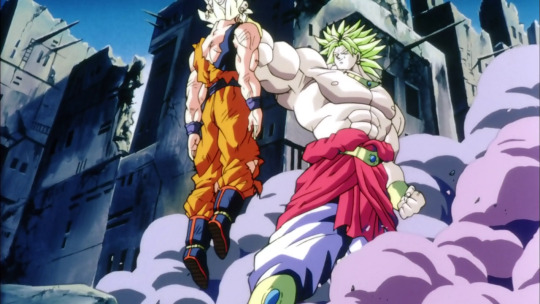
I have watched the many DBZ movies many times, and admittedly most of them are mediocre to somewhat awful. A few stand out, but none of them stand out more than Broly - The Legendary Super Saiyan. The movie feature the title character Broly, who is by far the most interesting DBZ movie villain. Besides the solid villain, this movie features some of the best fights in the franchise alongside the series’ signature comedy and fun. (Dubbed by Funimation)
24. Tokyo Godfathers (2003)
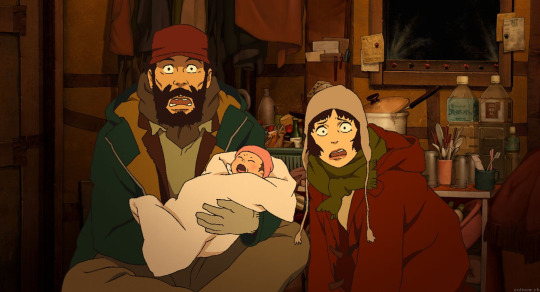
So, what happens when a homeless gambler, a runaway, and a trans woman find a baby in a dumpster on Christmas? Well, one of the most down to earth and light-hearted of the great Satoshi Kon’s films. (will talk about him more later...) Tokyo Godfathers deals with some tough source material and has a nice twist ending. The comedy is also played up well from the main trio of unlikely heroes. While my least favorite of Kon’s four films, it’s still a really fun watch particularly during the Christmas season. (can’t seem to find an official dub of this one unfortunately)
23. Psycho-Pass: The Movie (2015)
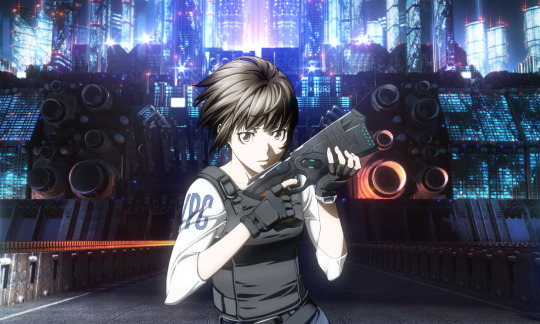
The two season series I like to refer to as Se7en meets Minority Report released a movie in 2015. As one would expect from as great of a series as Psycho Pass, the movie delivers on most fronts. While the movie doesn’t bring all that much new to the table, it’s better than the second season of the show and is highly entertaining throughout. The bodies still explode when shot and the looming sense of “Big Brother” remains from the series. A reunion between two characters from the first season was the highlight for me personally. (dubbed by Funimation)
22. Redline (2009)
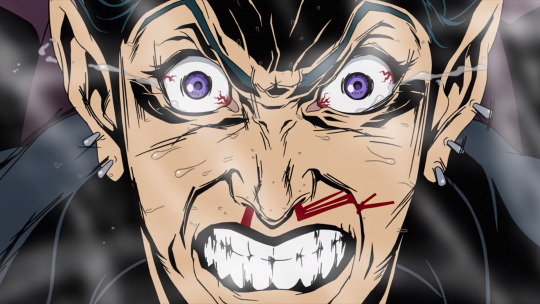
Let me get this out of the way first. Redline’s story has a lot to be desired. A LOT. However, the thing that makes Redline such an enjoyable watch is the incredibly unique and exhilarating artstyle and animation. Madhouse always has great animation work on all of their movies and shows (so good Madhouse was used in Kill Bill’s animated segment), but this could honestly be one of their finest works. The expressions of the characters, the violent racing of the many unique racecars (the focus of the film), and the nosebleed effects are stunning. Even if you don’t like racing or think the plot is lacking, Redline is worth a watch to marvel at its art. It’s pretty damn entertaining too.(dubbed by Manga Entertainment)
21. The Cat Returns (2002)
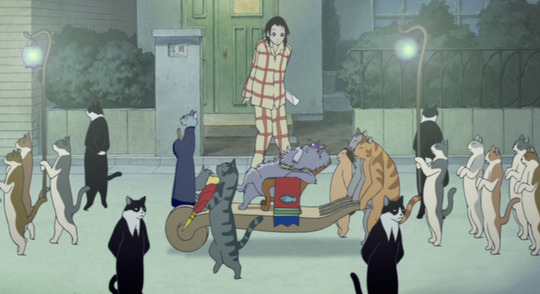
While not the deepest of all Studio Ghibli films, The Cat Returns is by far the funniest, at least in my opinion. At only 75 minutes in length, the tale of Haru, a clumsy high school girl, rescuing a cat prince is an underrated gem from the studio. The Baron, who first appears in Whisper of the Heart, appears here in a much bigger role, masterfully voiced by Cary Elwes. The film never takes itself too seriously, but it’s a blast the entire run time. Give this one a try if you’re in the mood for a quick, quirky anime film. (dubbed by Disney)
20. Millenium Actress (2001)
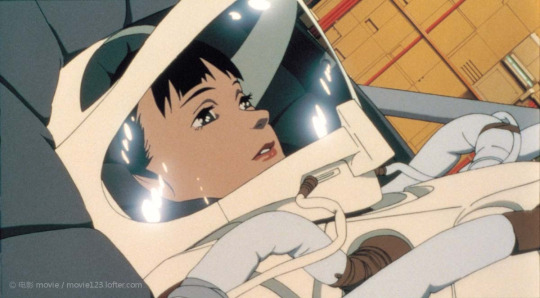
Ah, another fine work by Satoshi Kon. Millenium Actress is the story of the life of a now elderly actress who searched her entire life for a man she fell in love with at an early age. While the story has been done before, the aspect of Kon’s second film that makes it so great is the narrative and the way the story is told. Chiyoko, the main character, is being interviewed for a documentary on her life by a super fan and his less energetic cameraman. The interviewer and cameraman begin to actually appear in her flashbacks as characters in her many points in life, and it makes a really cool perspective. Not the fastest paced film, but Millenium Actress is definitely worth a watch. (dubbed by Bandai)
19. Summer Wars (2009)
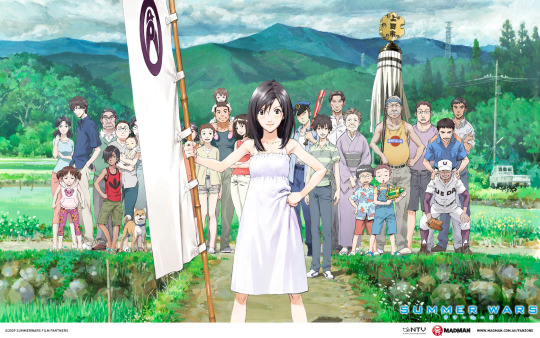
Mamorou Hosoda’s name is another you are going to hear a lot the rest of this list. Summer Wars begins innocently enough with a girl making a guy pretend he is her fiance in order to please her family and mainly her grandmother. On top of this plotline is the criminal activity occurring inside an advanced social network named OZ, which the male lead happens to be a part-time employee of. After a malicious user begins to take over the network’s world and begins to leak into the real world and things begin to unravel with the family, everyone must overcome their differences and defeat the enemy. Hosoda’s film is entertaining, a nice family-building film, and looks great on top of it. On a final note, I’m really happy to see Funimation have the chance to dub a high quality film like this. Michael Sinterniklaas and Brina Palencia are both great as usual. (dubbed by Funimation)
18. My Neighbor Totoro (1986)
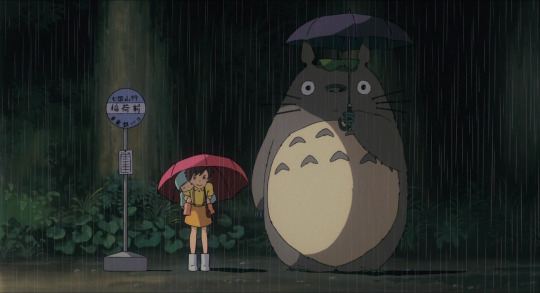
My Neighbor Totoro is an adorable film. That’s all there is to it. Totoro is the mascot of Studio Ghibli and maybe even Japanese animation for a reason. The film itself is very simple and bit odd, but that does not make it any less likable.There are just many fun set pieces put together including the famous umbrella scene, the climax scene with Catbus, and the sense of imagination and adventure you only feel as a child rolled in one.Of note, the newer dub by Disney is much improved and has solid early work by the Fanning sisters. (dubbed by Disney)
17. Cowboy Bebop: The Movie (2001)
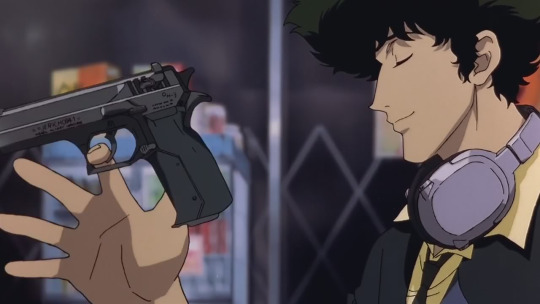
Those familiar to the anime world most likely know of how good the series Cowboy Bebop is. Those who have not seen the series yet should do themselves a big favor and give it a watch. The Movie is almost as good as the series itself. It gets a little more talkie than it should at times, but otherwise Bebop: The Movie is a solid addition to the great space western tale of the Spike Spiegel and the Bebop crew. The best part of Bebop: The Movie (other than the stellar jazz score) is that it feels like a reunion. We thought there was nowhere else to go with the lovable cast of the series, but then this movie appeared and brought all of them back for one last hurrah. Oh, and the dub is still fantastic. Bang. (dubbed by Sunrise)
16. Kiki’s Delivery Service (1999)
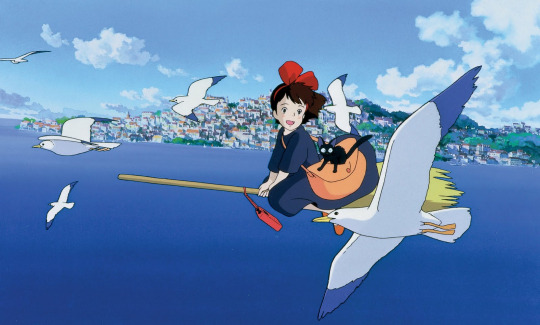
Kiki’s Delivery Service was a huge hit when it was released in Japanese theaters in 1989. There is no wonder why. Studio Ghibli delivers another simple, but enjoyable tale of a clumsy, young witch named Kiki. I find Kiki to be one of the most likable Ghibli leads due to her great determination to accomplish something yet feeling like she’s not good at anything. Some nice set pieces and being thoroughly entertaining throughout makes Kiki enjoyable for any age. On a final note Phil Hartman turns in his final performance in an animated film as Jiji the cat. As one would guess, he’s great. (dubbed by Disney)
15. Porco Rosso (1992)
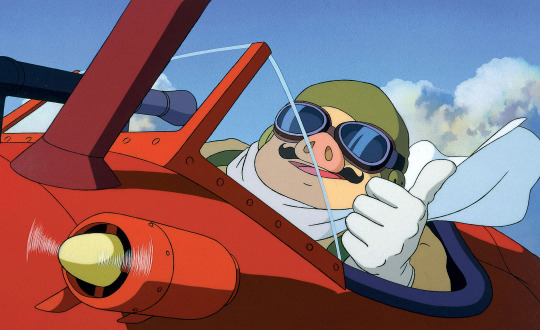
Similar to The Cat Returns, Porco Rosso is one of the less deep Studio Ghibli entries. But man, is it a fun one. Porco Rosso follows the adventures of an anthropomorphic pig nicknamed Porco, a former Italian military pilot, on his zany quest to fight an overconfident, but very talented Texan pilot named Donald. The main two characters, Porco and Donald, alongside good supporting characters are some of the most fun in any Ghibli’s film. This is aided by some great dub performances, specifically from Michael Keaton as Porco, Cary Elwes (again!) as Donald, and Brad Garrett as an unsuccessful pirate rival. Watch this one for some fun and the pig puns. There’s a ton. (dubbed by Disney)
14. Wolf Children (2012)
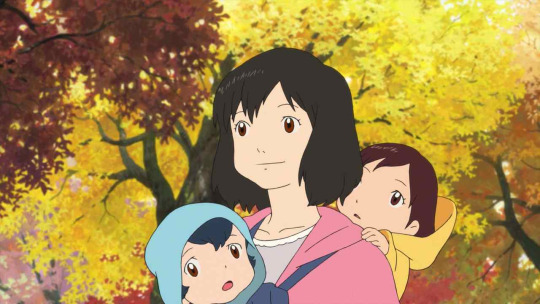
Wolf Children is one of the slower films on this list, but that does not make it any less good. Directed by Hosoda, same guy who did Summer Wars, Wolf Children is the most mature of his films that I have seen. While the initial subject matter of a woman having children with a werewolf (wolf form) sound a little strange and questionable, the rest of the film is full of heart as Hana raises her werewolf children on her own without any help. Through the highs and the lows, Hana grows and so do her children. As one can expect, the character development is really good here and helps lead up to a very satisfying, yet bittersweet ending. This movie may be a feels trip, but I highly recommend it. Funimation does another nice job here with one of my favorite performances from Colleen Clinkenbeard ever. (dubbed by Funimation)
13. Whisper of the Heart (1995)
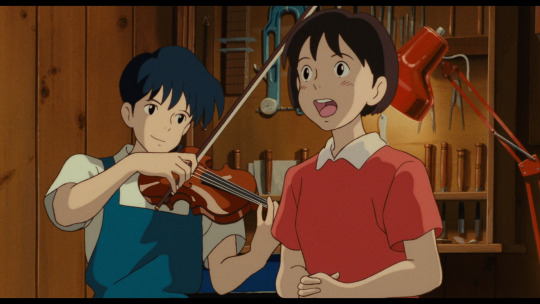
Here I present what I feel to be the most underrated Studio Ghibli film to date. Whisper of the Heart was directed by Yoshifumi Kondo, which means this movie was the first hit from the Studio not directed by Miyasaki or Takahata. Sadly, this was the only film Kondo was able to direct for the Studio due to his unfortunate death only a couple years later. Kondo’s gem contains the least fantasy elements of the Studio’s films, yet it has one of the most taut, well-told stories of the group. WotH is a coming of age story with a focus on romance between a girl and the boy who checked out library books before her. Don’t miss this one like many people have. (dubbed by Disney)
12. Princess Mononoke (1997)
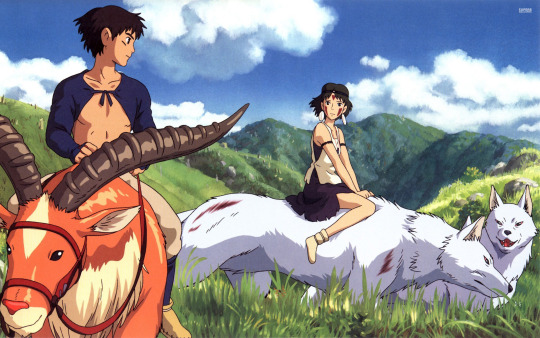
The placement of Princess Mononoke on this list may be controversial to many. (possibly because of the length...) However, that does not mean that I don’t love this film. Mononoke is a much darker and bloodier entry than most Miyasaki films, which I like for a change of pace honestly. The fantasy elements are strong in this entry and the characters are stalwart as well. Every character in the movie has different motivations and it makes for a compelling story. Everyone, good and evil, wants something for a different reason and the resulting clashes make a compelling watch. (dubbed by Disney)
11. Madoka Magic Movie 1: Beginnings (2012)
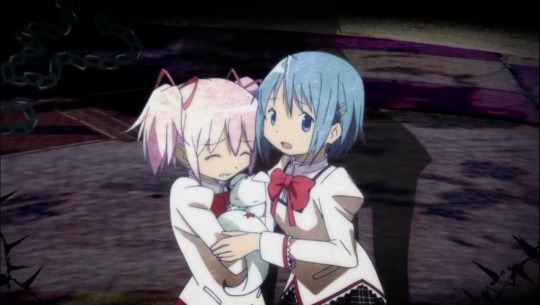
Don’t judge a book by its cover: the movie. Beginnings is a movie that covers the first seven to eight episodes of the wonderful twelve episode anime series. To those unfamiliar with Madoka Magic, this is no Sailor Moon. It’s kind of like the combination of Sailor Moon and Neon Genesis Evangelion, which makes for quite a different kind of magical girl series. One not for the faint of heart... What makes this film so good is the way each girl develops as a character and the way that each slowly unravel as worse and worse events keep happening. This is a great summary movie and a good alternative to those who prefer watching movies over series, even if the series is only twelve episodes. (dubbed by evil over-pricing Aniplex)
10. Ghost in the Shell (1995)
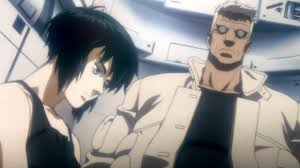
When Ghost in the Shell only finishes in tenth on a list, you know there is going to be true quality in your top ten. Ghost in the Shell is a cyberpunk/sci-fi classic that deserves the praise it gets. The Major is an absolute badass, the villain is pretty cool, and there are many memorable action scenes and mind-bending scenes. GitS is one the smartest sci-fi movie I have seen overall due to its exploration into what it is to be human. Why is this classic not higher? No clear reason. Maybe it is because I like the GitS: Stand Alone Complex series better than the film (one I notably forgot on my top 50 series list). Still fantastic nonetheless. (dubbed by Manga Entertainment)
9. The Girl Who Leapt Through Time (2006)
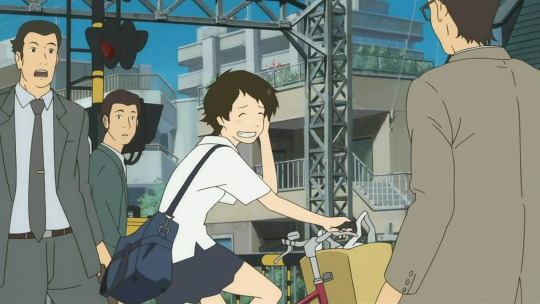
Hosoda’s first film is my personal favorite of the three appearing on this list. The Girl Who Leapt Through Time is a nice blend of the slice of life genre with sci-fi. When a normal, clumsy teenage girl in Japan discovers she can “time leap” backwards, she uses it in many fun and manipulative ways. As with most time traveling series and movies, this usually does not end well for the main character doing the time leaping. What makes Hosoda’s film so enjoyable is how likable the characters, particularly Makoto, are and how well the story is constructed. That is rare for a time travel story. Overall, this is one anime film I’d recommend for almost anybody. (dubbed by Bandai and owned by Funimaiton)
8. Howl’s Moving Castle (2005)
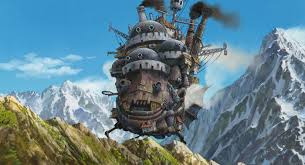
Howl’s Moving Castle is probably my first or second favorite movie released in the dreadful movie year of 2005. I’ll probably make another list one day to talk more about that. Anyway, here’s one of the more divisive Miyasaki films. Some think it’s amongst his finest while others put it near the bottom. Personally, I think it’s one of his best. The main character, Sophie, is trying to break a curse put on her by an evil witch that turned her into an old woman. She believes a young sorcerer named Howl may have the fix for her. While curses are a very common plot device in Ghibli films I think the execution in HMC is excellent. Not quite as excellent as Christian Bale voicing Howl’s giant bird form in his Batman voice, but it’s a close second. (dubbed by Disney)
7. Evangelion 2.22: You Can (Not) Advance (2009)
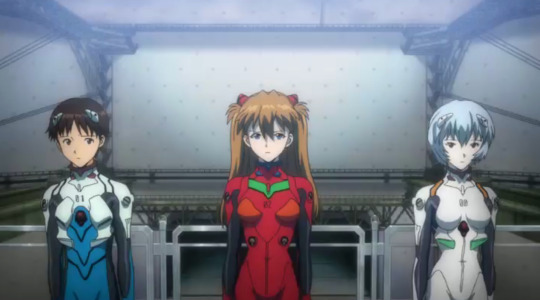
While every film up to this point have been really solid works, here is where we hit the top tier. I went through these seven and rearranged them several times and am still not sure if they are in the right order. Oh well. Here’s a fantastic film and sequel to start with. Evangelion is a sequel to the first Evangelion “rebuild” movie that retells the story of the story of Neon Genesis Evangelion. The first entry was great, but the sequel was a huge step up. What makes 2.22 so great is it fixed big issues from the original series and made the (f’d up) cast more developed and likable. (besides Shinji’s dad. He’s still an asshole) The art and animation is also beautiful. Watch this on blu-ray if you possibly can. (dubbed by Funimaiton)
6. Spirited Away (2001)
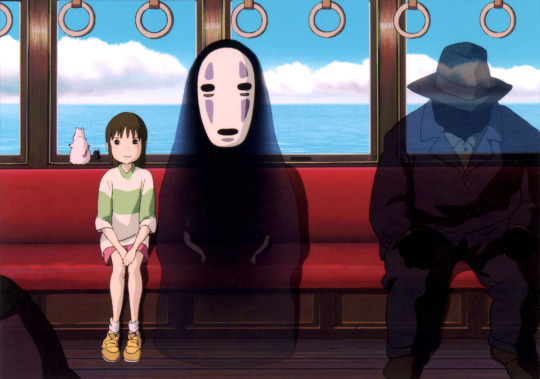
Not my number one, huh? Spirited Away is an anime film masterpiece. The ending being a little loose is the only thing I think holds it back a bit, but it did so much for anime in the United States that I can forgive it for that flaw. From the memorable characters and scenes, Spirited Away is magical. I cannot say much more that has not been said a million times, so I just end by telling you to watch this if you have not. (dubbed by Disney)
5. Parika (2006)
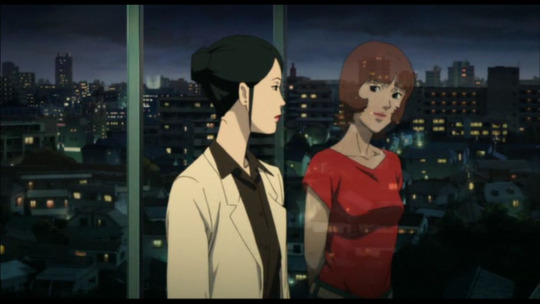
I would be lying if I did not say Satoshi Kon’s final film is one of the strangest I’ve ever seen in any medium. That being said, it is absolutely terrific. Paprika tells the pre-Inception story of entering dreams and the madness that lies within some minds. From its thrilling opening sequence to its explosive conclusion Paprika can be described as nothing less than a thrill ride. I struggle to talk about this one much without spoiling the entire film, so just do yourself a favor and watch it. Just don’t do it before bed like I did, or you’ll have really weird dreams. (dubbed by Manga Entertainment)
4. The Disappearance of Haruhi Suzumiya (2011)
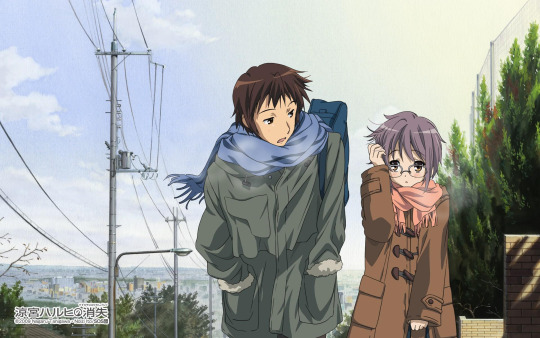
The Melancholy of Haruhi Suzumiya is a classic, zany anime series that established slice of life character archetypes for a decade after its release. However, not everybody is as big on it as I am. Whether it is the mostly comedic feel, the Endless Eight arc (seriously, it sucks), or annoyance at Haruhi or Mikuru, most people see it as an imperfect series. However, I don’t hesitate to say The Disappearance of Haruhi Suzumiya is as closest as you can get to a perfect anime series film. The film takes a more serious tone and uses it to develop Kyon, the main character, and Yuki, one of the more underdeveloped characters from the series. What results is a “It’s a Wonderful Life” type film combined with the best portions of the twenty-eight episode series. This film doesn’t feel at all like 160 minutes. It looks gorgeous too. Unfortunately, you have to watch the series to watch this gem. (dubbed by money-grubbing Aniplex) [NOT CURRENTLY AVAILABLE ON DVD OR BLU RAY!!!!!]
3. Akira (1989)
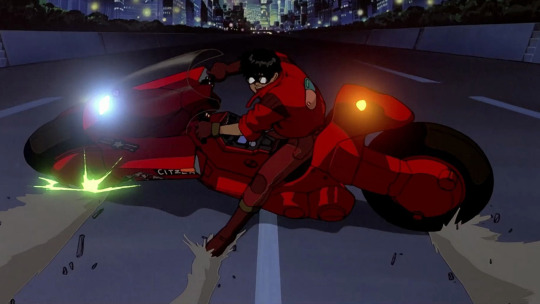
KANEDA!!!!!!! I do not think I have to say much here either. Akira’s reputation is so good even outside of the anime realm that I don’t think I have to say much. The animation to this day is stunning, the writing has inspired sci-fi/cyberpunk films to this day, and it’s one of Quentin Tarantino’s favorites. Just talking about it makes me want to go watch it again. Do yourself a favor and do the same. (dubbed by Geneon (RIP)/Funimation)
2. Laputa: Castle in the Sky (1986)
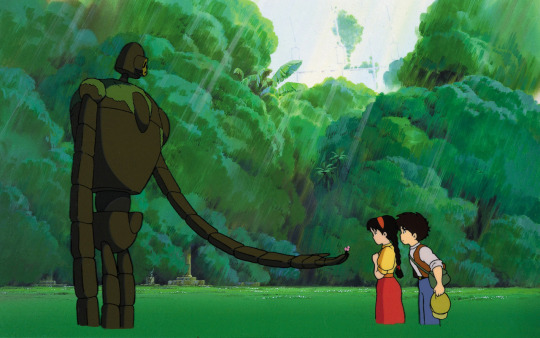
I have always loved Castle in the Sky. I just didn’t realize how much until recently. Castle in the Sky is the perfect blend of action, Studio Ghibli fantasy, and memorable peaceful scenes. Laputa’s plot is simple. A girl with a special ability and a boy who helps her race against a group of pirates and the military to find the fabled Castle in the Sky, which is supposedly filled with treasure. The pacing will please children and adults and only a heartless person could not find at least a couple of the characters likable. The main villain, Muska, is one of the most evil PG level villains I have seen in any cartoon movies. He’s voiced perfectly by the always terrific Mark Hamill, who sounds a lot like the Joker at times here... In conclusion, Castle in the Sky is a terrific fantasy film and a Ghibli masterpiece. (dubbed by Disney)
1. Perfect Blue (1998)
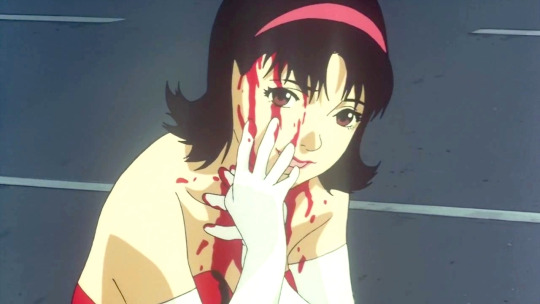
Now, this was my toughest decision of the entire year so far. No joke. After thinking about what would be my number one anime film for several hours, this one kept popping up near the top. The reason may be how inspirational this film is to my own writing. Maybe it’s the similarity to one of my favorite live action films of the last decade, Black Swan. Maybe it’s just a damn good film. Perfect Blue mashes the horror, mystery, psychological genres, and anime into a blender and produces a masterpiece. From the creepy stalker character (possibly the creepiest looking character ever drawn), to the lightpole dancing/hopping scene, to all of the actual murder scenes, Mima’s spiral into insanity is a journey unlike most others in film. Satoshi Kon directed this film and it shows. Perfect Blue encapsulates his use of gore, overall weirdness, nudity, and other elements for what I believe to be his best work. Like Madoka Magic and Paprika, this film is not for the faint of heart. Just a warning. If you think you can watch Perfect Blue, do it. You won’t regret it.(dubbed by Manga Entertainment) [NOT CURRENTLY AVAILABLE ON DVD OR BLU RAY!!!!!]
2 notes
·
View notes
Link
Fame, if you win it,
Comes and goes in a minute.
— Jule Styne, Betty Comden, and Adolph Green, “Make Someone Happy”
The pure products of America
go crazy.
— William Carlos Williams, “To Elsie”
¤
DRIVE DOWN some of Hollywood’s major thoroughfares or visit some of its celebrated tourist attractions, like Grauman’s Chinese Theatre, and you’re bound to see at least one mural featuring bona fide pop icons like Marilyn, Elvis, and James Dean. Depending on the artist, the players joining Marilyn might include Sinatra, John Wayne, or Chaplin. If Duke Haney, the author of Death Valley Superstars, commissioned his own mural, the Hollywood Chamber of Commerce might not approve. Yes, Marilyn would still be there, but her supporting cast would be a bunch of troublemakers as obscure as she is famous — Steve Cochran, Sean Flynn, Mark Frechette, Christopher Jones — as well as the notorious Lee Harvey Oswald and William Desmond Taylor, the victim of one of Hollywood’s greatest unsolved mysteries.
The personalities on Haney’s mural are just some of the subjects he profiles in his engrossing new collection of essays, Death Valley Superstars: Occasionally Fatal Adventures in Filmland. All but one of Haney’s pieces were originally published on Brad Listi’s literary website The Nervous Breakdown, where I discovered his work in December 2013. Familiar with Haney’s experience writing screenplays and acting in low-budget films, Listi, who had published Subversia (2010), Haney’s first collection of essays, invited him to begin writing about Hollywood. Haney twice demurred, not wanting to be known as just another Kenneth Anger. “I had been struggling to start a novel for two years to no effect,” Haney recently told Listi on his podcast, “and it might rejuvenate me to work instead on a quirky tour of a neglected career and colorful life [tough guy actor Steve Cochran] — an appreciation with elements of biography.” He accepted Listi’s invitation and began writing biographical essays on some of destiny’s darlings, and a number of also-rans who briefly achieved a measure of fame only to see it undone by scandal, misbehavior, or malign fate. Superstars isn’t restricted to luminaries of the screen: Hugh Hefner, Jim Morrison, and the aforementioned Lee Harvey Oswald show up in its pages. Haney’s deep research, fresh insights, and engaging prose bring these subjects to life. He also includes several lively accounts of his own experiences working for legendary cheapjack producer Roger Corman and even more marginal Hollywood operators.
Haney leads his book with a powerful memoir, “When Dinosaurs Ruled the Earth,” a real cri de coeur recalling how the New Hollywood films of the ’70s celebrated in Peter Biskind’s book Easy Riders, Raging Bulls inspired him to journey to Hollywood to make the same kinds of films, only to discover that the blockbuster success of Star Wars and its successors had already killed the New Hollywood movement, torpedoing the career Haney had imagined for himself in Charlottesville, Virginia, where he had immersed himself in movies screened at the palatial Paramount Theater and a local revival house. There, he discovered the Holy Trinity of Method acting — Marlon Brando, Montgomery Clift, and James Dean — and their ’70s equivalents — Al Pacino, Robert De Niro, Jack Nicholson, and Dustin Hoffman — all of whom he had hoped to emulate once he hit Hollywood.
Haney’s essay could easily be titled “Star Wars and Its Discontents.” He spends a hefty chunk of “Dinosaurs” expounding on the detrimental effect of that beloved franchise. Star Wars did more than merely change Hollywood’s commercial ecosystem, infantilizing movies. It became a cultural Death Star, Haney contends, whose puerility pervaded society, reducing adults to Peter Pans who are not ashamed to line up at the box office for movies that would once have been considered strictly kid’s stuff and to buy “adult” coloring books.
In the powerful conclusion of “Dinosaurs,” Haney recalls his childhood self going to see a movie (When Dinosaurs Ruled the Earth [1970]) for the first time:
I can picture him now, about to see a movie alone for the first time. He walks up the long corridor, carpeted in red, of the Paramount Theater, pausing at the concession stand to gawk at thumbnail photos of the posters for sale, and a voice in his head says, Don’t look. God doesn’t want you to look. But the voice is quiet in the darkness of the auditorium, where the boy watches a girl in a fur bikini cavort anachronistically with a dinosaur, and the boy thinks, Man, I would love to be that dinosaur, never dreaming that, when he’s a man, a dinosaur is just what he’ll be.
Someone once wisely said that participation in sports doesn’t create character, it reveals it. The same can be said of the effects of fame and its pursuit, something personified by Marilyn Monroe and Lee Harvey Oswald, Haney’s most famous subjects. They were both pathetic wretches who thought that fame would enable them to escape the pain of anonymity. Monroe was a perpetually unhappy woman who never knew her father and whose mother had a disordered mind. The response she got for modeling for some rather chaste cheesecake photos set her direction. With considerable effort, she became a worldwide sex goddess, but her fame only exacerbated her unhappiness. She finally found release in a bottle of Nembutal one lonely night.
In “Golden State Girl,” Haney argues that Monroe was a genuine artist whose greatest creation was her inimitable screen persona. “There’s no pathos in the image they propose,” Haney writes, after describing several instances of her hateful behavior,
but there’s pathos aplenty in the image of Marilyn as a wounded stray, as the candle in the wind of Elton John song, as a martyr of celebrity, of Hollywood, of men and patriarchy and the male gaze. This image — and it’s finally a single image — excludes those traits it can’t, and doesn’t want to, accommodate: opportunism, toughness, willfulness, petulance, all of which, and then some, can be found in a convoluted woman with a genius for appearing the opposite.
Lee Harvey Oswald was born two months after his father died. His mother was a kook. He believed that he deserved to be a major actor on the stage of history, not just some nobody sweating his life away stacking boxes of schoolbooks in an old warehouse. The secret delight he must have enjoyed after making himself the focus of the world’s attention lasted only two days before a .38 bullet in his belly ended his life. In “Oswald Has Been Shot,” Haney explores the possibility that three movies that Oswald saw — We Were Strangers (1949), Suddenly (1954), and The Manchurian Candidate (1962) — may have inspired him to kill the president.
As his essay on Oswald demonstrates, outsiders fascinate Haney. And that fascination extends to Hollywood’s outsiders, the nearly forgotten actors who were deserted by fame in their own lifetimes. Haney is their champion. In Superstars, he tells the stories of Sean Flynn, Mark Frechette, Steve Cochran, and Christopher Jones in captivating detail and provides us with the most complete biographies these men are ever likely to get.
Sean Flynn inherited the handsomeness of his father, legendary screen swashbuckler Errol Flynn, but lacked his casual élan in front a movie camera. Sean sought adventure as a photographer in war torn Vietnam and Cambodia, where he disappeared in 1970. Steve Cochran possessed a kind of oily charisma that suited his portrayals of shady characters in films like White Heat (1949) and Private Hell 36 (1954). He was an uncomplicated man who cared only for masculine luxuries — exotic sports cars and boats — and women: he had an insatiable sexual appetite. He could also be physically violent with them. He died horribly when a mysterious disease suddenly struck him as he was sailing his yacht Rogue in the waters off Guatemala, while a crew of barely legal Mexican women he had hired to help him promote a film project could only look on helplessly.
Mark Frechette never wanted to be an actor. He didn’t know what he wanted to do until he fell under the spell of cult leader Mel Lyman in Boston. After a talent scout for director Michelangelo Antonioni spotted Frechette in New York, Antonioni cast him as a campus radical running from the law in Zabriskie Point (1970). Frechette often sparred with Antonioni during the shoot. It didn’t matter; he was only doing it for Mel. Frechette’s misbegotten idea of a revolutionary political statement was to rob a bank, which got one of his accomplices killed. Frechette died in prison when a barbell fell on his neck, asphyxiating him. He was only 27.
Christopher Jones rocketed to stardom in only his second film, Wild in the Streets (1968), a political fantasy about a 22-year-old rock star who becomes president. He bore a striking similarity to James Dean, with the same mesmeric ability to seduce an audience. Jones quit acting abruptly after filming Ryan’s Daughter (1970) and became an enigmatic recluse until his death in early 2014 at age 72. In what may be the most fascinating piece in Death Valley Superstars, Duke Haney does much to unravel the shadowy mystery of Jones’ post-Hollywood years for the first time.
“I think Hollywood is the true Death Valley,” says Haney, “because it’s where dreams go to die, and sometimes the dreamer.” Fortunately, Haney is still with us — and we owe him our thanks for Death Valley Superstars, a dream of a collection.
¤
Peter L. Winkler is the author of Dennis Hopper: The Wild Ride of a Hollywood Rebel (Barricade Books, 2011) and the editor of The Real James Dean: Intimate Memories from Those Who Knew Him Best (Chicago Review Press, 2016).
The post Hell Down in Hollywood: On Duke Haney’s “Death Valley Superstars” appeared first on Los Angeles Review of Books.
from Los Angeles Review of Books http://bit.ly/2UITses
via IFTTT
0 notes